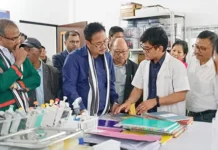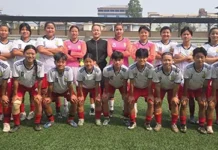[ Sawang Wangchha ]
(Note: This article is written purely as a reflection on how society has reacted to the ongoing dual suicide case in Arunachal Pradesh. It does not aim to blame any individual, assume anyone’s sexuality, or determine guilt or innocence. It is an observation through the lens of a queer-trans activist who wishes to highlight the need for empathy and sensitivity in times of tragedy.)
When human lives are lost to suicide, it should shake us more than it should entertain us. The focus should be on the rising issue of suicide and what drives people to such despair. Unfortunately, across the internet circles of our state, Arunachal Pradesh, we see otherwise. There are fewer words of empathy and understanding, and more noise filled with gossip, speculation, and judgment, not even sparing the young man who took his own life. Instead of reflecting on the deeper reasons behind such a “shocking” tragedy, people seem to consume it like entertainment, unaware that their daily scroll is someone else’s real pain.
The internet is now flooded with citizens tearing apart the names and characters of those involved in the recent dual suicide case, without understanding or even knowing the truth. Facebook, especially, has become a hub of hate, filled with homophobia, mockery, and vile character-assassination memes. Many are even questioning whether a man can be exploited or assaulted by another man, revealing how deeply stigma and ignorance still shape public perception. Online groups and pages are overflowing with unhinged comments and targeted jokes, with no control, moderation, or sense of responsibility. Cyberbullying has become rampant, even against the dead, and it is frightening to see how easily cruelty has been normalized in a place once known for its kindness, sincerity, and honesty.
About the case itself, without confirming anyone’s sexuality or blaming any side, as it is neither my duty nor my place, what this incident reveals is something deeply rooted and long ignored. It reflects the painful reality of many LGBTQ+ people, both young and adult, who are forced to live dual lives, one to survive and another to simply be themselves. They spend their lives trying to fit into heteronormative expectations shaped by social pressure and fear of rejection, while the world around them continues to perpetuate stigma against same-sex relationships, against HIV, against queerness, and against anything that refuses to conform to the rigid norms of a patriarchal and heteronormative society. These manmade stigmas around HIV, sexuality, and identity keep harming people silently, not because of any disease or difference, but because of ignorance, moral judgment, and the comfort of denial. When society criminalizes or shames love and identity, people learn to lie, to hide, and to suffer in silence.
This is not the first time that accusations linked to same-sex relationships or exploitation have surfaced in Arunachal, or even across the whole of India. With this case, many laypeople in our state have begun discussing such issues, perhaps for the first time trying to understand their complexity. Working closely with my community and listening to people’s stories, I have seen how common such cases are, and how deeply they reflect our society’s unwillingness to accept difference. The real question we should be asking is: why do such cases keep happening? How can we protect the vulnerable in such cases? The answer lies in how society continues to push queer and trans people into secrecy and shame, and then questions whether man-to-man exploitation or abuse can even exist. When someone is forced to live in fear and denial, despair follows. And sometimes, that despair turns fatal. Perhaps this time, the noise feels louder because it involves people from more visible or influential circles, but the underlying truth remains the same: silence, shame, and stigma continue to destroy lives.
As someone from the LGBTQIA+ community myself, and without assuming anyone’s sexuality or personal preferences in this particular case, I find it painful to watch how something that deserves sensitivity and compassion has turned into a meme carnival. People are not even sparing the 19-year-old boy who ended his life, while his grieving family endures unimaginable pain. They deserve compassion, not mockery. And let us not forget the queer community, which is once again being targeted with homophobic attacks disguised as jokes and memes. People need to understand that suicides among gender and sexual minorities are far more common than most realize, and they demand care, empathy, and understanding rather than ridicule or silence. Yet the way people are behaving like bullies all over social media has left many queer and trans people I know feeling overwhelmed with depression and anxiety. And let us not forget their families, who live in constant fear for their safety and dignity.
One thing is clear: our society is still not ready to understand the core reasons behind such tragedies. We refuse to talk about mental health, suicide, isolation, and how stigma quietly kills. We find comfort in blame and spectacle because it is easier than introspection. But until we learn to look inward at how we fail our youth, our queer friends, and our own humanity, these stories will keep repeating. This is not an isolated incident but a reflection of a larger, systemic failure. And yes, I blame society for that failure.
With our team, AP QueerStation, we organize listening circles and sensitization programs throughout the year. These are safe spaces where people can find comfort, friendship, counseling, legal support, and understanding. But this recent case has brought a wave of negativity, as so many people in Arunachal have been responding with ignorance, hate, and homophobic remarks, along with wrong and misinformed opinions across social media. It has left the community exhausted, disturbed, and once again made to feel unaccepted and unloved. Some members have even said that it has undone much of the sensitization work we have done over the past year. The hate and homophobia have left many of us feeling hopeless, questioning how much progress we have truly made as a society.
Our society needs to do more. Education about gender and sexual identities, suicide prevention, safety, and consent are the urgent needs of the hour. The government too must prioritize creating safe spaces for LGBTQIA+ individuals and invest in mental health, suicide prevention, and comprehensive sex and sexuality education without unnecessary shame or taboo. We need to speak about these issues with sensitivity and awareness. Only then can we begin to heal and ensure that such tragedies are never repeated. However, when it comes to the departments responsible for addressing issues concerning the LGBTQIA+ community, they have rarely been active or shown genuine concern for what we ask for, even for something as basic as organizing sensitization events. This I say from our own experience with the SJETA department of our state. They need to work for us too.
This case may have its own complexities, but suicides within gender and sexual minority communities are heartbreakingly common. Families and friends need to be more understanding if they truly love their loved ones. Sometimes, all a person needs is to be heard without judgment. Saying “everything was fine, we don’t know why he left us” is not enough. We need to look after each other, to listen to one another, and to treat mental health with the same urgency and importance as any other crisis. Counseling, empathy, and open conversations can save lives.
I want to end by requesting readers to show empathy and understanding toward everyone affected by this case. Let justice take its course, and let the truth come out with dignity. At least think about the families of those involved, who are still living through unimaginable pain. If you cannot say something kind, then it is better not to say anything at all. We, as a society, need to be kinder and develop the capacity for both critical thinking and compassion. Today it happened to them; tomorrow it could be someone close to you. Often, the same people who mock or judge others don’t realize that someone they love might be silently suffering. Be mindful. (Sawang Wangchha is the founder of AP QueerStation)


